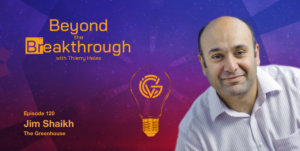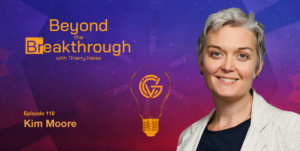-
Andy Shenk: New Zealand’s remoteness makes it ideal for space tech (rebroadcast)
Andy Shenk, the chief executive of Auckland UniServices, the commercialisation subsidiary of the University of Auckland, knows that collaborating with the Māori people is important. He also knows that big data and AI offer great opportunities, but tells me about some of the challenges too.
-
Anita Nel, Brandon Paschal: South Africa is building a world-class innovation ecosystem
Setting up a venture fund in 2020 was a “huge paradigm shift” for Stellenbosch University in South Africa, because, for the first time, the executive leadership at the institution became interested in spinouts, says Anita Nel, the chief director for innovation and business development, because they understood that academic research had commercial value and a way to build, for example, local pharmaceutical expertise (the country had to wait six months longer than the northern hemisphere for a covid-19 vaccine because there were no vaccine developers or drug discovery companies in all of Africa).
-
Panel discussion: Can we fix “insane” immigration policies to attract entrepreneurs?
Immigrants are profoundly entrepreneurial people: they leave behind everything they know for a new country and new opportunities, often at a financial risk. This willingness to embrace change and build a new life from scratch means it should not be a surprise that in the US alone, 43% of Fortune 500 companies have been founded by immigrants.
-
Paul Devlin: Cardiff is at the forefront of social sciences commercialisation
Commercialising social sciences research is such a new area of technology transfer that when you spin out a company “you might be the first to do that type of deal,” says Paul Devlin, the head of research commercialisation and impact at Cardiff University.
-
Ilian Iliev: Here’s why NetScientific is doubling down on Cambridge
Last month, EMV Capital, a fund management subsidiary of British investment firm NetScientific, took over Martlet Capital, a Cambridge, UK-focused investor that had been the corporate venture arm of aerospace and defence company Marshall Group for nine years until 2021. The decision was the natural conclusion to EMV’s earlier decision to become an investor in Martlet and allows the investor to further tap into the Cambridge cluster, NetScientific CEO Ilian Iliev says.
-
Fernando Moncada: Five lessons for would-be academic founders
Universities, by their very nature, have always been strong centres of innovation. Scientific discoveries are routinely made in university research labs – but spinning those discoveries out into an operational business comes with numerous hurdles.
-
Duncan Johnson, Miles Kirby: NG Studios helps entrepreneurs think big
Duncan Johnson argues that spinout founders in the north of England need to learn to think bigger. That’s not just a question of access to capital (his investment firm Northern Gritstone has £312m at its disposal) but also of infrastructure to mentor and nurture these founders.
-
Jim Shaikh: Corporates drawn to climate tech innovation at Imperial College London’s Greenhouse accelerator
Some of the most innovative clean energy and climate technologies originate in the labs of the world’s research universities. At Imperial College London’s climate innovation accelerator, The Greenhouse, startups address solutions in niche areas such as bio-textiles, waste management and green hydrogen.
-
Season 2 Recap
We take a look back at some of the key insights shared by guests on season 2 of Beyond the Breakthrough.
-
TU Darmstadt has developed a unique approach to licensing
Licensing intellectual property to a spinout can take frustratingly long and end with terms for a spinout that a venture capital investor might not be comfortable with — the university taking too large a share is a typical argument that you’ll hear particularly in the UK. There are initiatives to speed this up. The US has BOLT and the UK has the USIT Guides, template term sheets co-developed by tech transfer offices, investors and law firms to significantly speed up the process. Ireland even has a national IP protocol.










